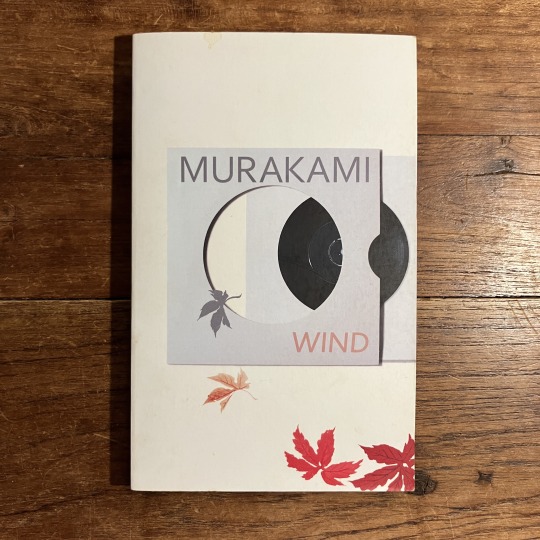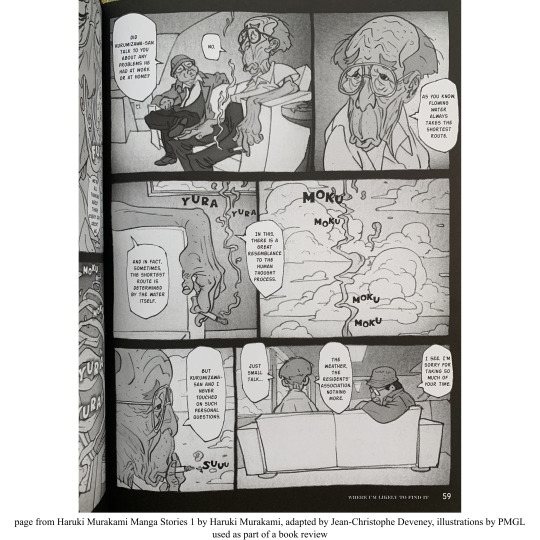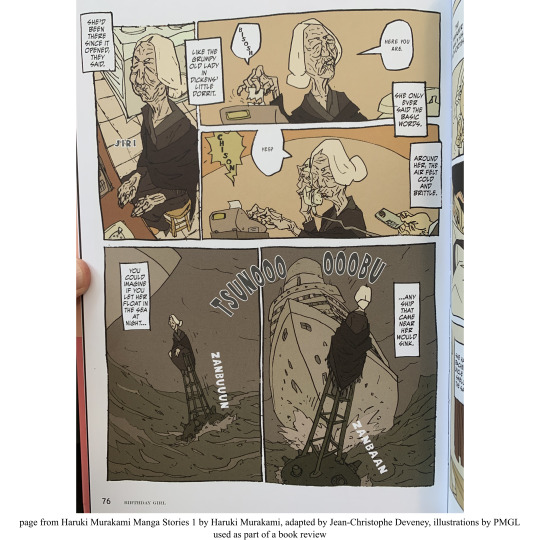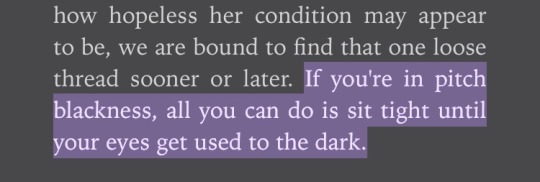#HarukiMurakami
Text
Das Böse und die Harmonie

Der japanische Regisseur Ryusuke Hamaguchi gewann mit seiner Murakami-Verfilmung »Drive My Car« einen Oscar. Nun ist sein neuer Film »Evil Does Not Exist« im Kino zu sehen, der in meditativen Bildern dem Raubbau des Menschen an der Natur auf den Grund geht.
Read the full article
#AyakaShibutani#EikoIshibashi#featured#HarukiMurakami#HazukiKikuchi#HiroyukiMiura#HitoshiOmika#MohammadRasoulof#RyoNishikawa#RyujiKosaka#RyusukeHamaguchi#WimWenders#YoshioKitagawa
0 notes
Text

古本(洋書・英語)/HARUKI MURAKAMI(村上春樹)『HEAR THE WIND SING(風の歌を聴け)』/VINTAGE/1,000【通信販売】
0 notes
Text
Amare qualcuno dal profondo del cuore è comunque una grande consolazione. Anche se si è soli e non si riesce a stare con quella persona.
0 notes
Text
Pain is inevitable. Suffering is optional.
- Haruki Murakami, What I Talk About When I Talk About Running
0 notes
Text
“Khi đang viết tiểu thuyết, tôi thức lúc 4 giờ sáng và làm việc từ 5 đến 6 tiếng. Vào buổi chiều, tôi chạy mười cây số hoặc bơi khoảng một cây rưỡi (hoặc cả hai), sau đó tôi đọc sách một chút và nghe nhạc. Tôi đi ngủ lúc chín giờ tối.
Tôi giữ thói quen này hàng ngày mà không thay đổi. Bản thân sự lặp lại đã trở thành điều quan trọng; đó là một hình thức thôi miên. Tôi mê hoặc bản thân để đạt đến trạng thái tâm trí sâu hơn.
Nhưng để duy trì sự lặp lại như vậy trong thời gian dài - sáu tháng đến một năm - đòi hỏi phải có sức mạnh thể chất và tinh thần tốt. Theo nghĩa đó, viết một cuốn tiểu thuyết dài cũng giống như việc rèn luyện cơ thể. Sức mạnh thể chất cũng cần thiết như sự nhạy cảm về nghệ thuật.”
The Ladders Haruki Murakami
4 notes
·
View notes
Text
Kötü günlerin iyi yanlarıda vardır; insanları tanırsın. Özellikle iyi sandıklarını...
5 notes
·
View notes
Text
🎂 Azi îl aniversăm pe Haruki Murakami.
Cărțile autorului au astăzi preț special, cu până la 28% reducere față de prețul afișat.
La mulți ani!
0 notes
Text






It's hard to find "graphic novels" full of short stories to recommend to adults, but here are two I loved.
Haruki Murakami Manga Stories 1 by Haruki Murakami, adapted by Jean-Christophe Deveney, illustrations by PMGL. Tuttle, 2023. 9784805317648. 144pp. https://www.powells.com/book/-9784805317648?partnerid=34778&p_bt
Contains adaptations of "Super Frog Saves Tokyo,""Where I'm Likely to Find It," "Birthday Girl," and "The Seventh Man."
Though I once read every one of Murakami's short story collections, it's been a while since I've read one, and I don't specifically remember any of these. But the adaptations capture the strangeness of some I remember and the drifty, specific vibe I associate with others. I admired PMGL's art and particuarly the way the coloring and style varied from story to story, plus Deveney's adaptations are solid.
I'll be picking up the forthcoming second collection of Murakami's stories from Tuttle because I loved this on, and also because it contains one of my favorite short stories, "The Second Bakery Attack."
Werewolf at Dusk and other stories by David Small. Liveright, 2024. 9781324092827. 192pp. https://www.powells.com/book/-9781324092827?partnerid=34778&p_bt
Contains adaptations of "Werewolf at Dusk" story Lincoln Michel and "The Tiger in Vogue" story by Jean Ferry, as well as a story by David Small, "A Walk in the Old City."
Small's art is exact and beautiful, and somehow he manages to make it feel immediate, as if the pages are full of wonderous, quick sketches. My favorite thing about this collection is the way Small balances words and images to tell the stories, plus I also love how he draws objects and people in the distance. When you pick up this book, I think you'll be wowed by the way he uses red in the first and last stories.
22 notes
·
View notes
Text
Haruki Murakami | Author Biography

Haruki Murakami, a literary maestro known for his mesmerizing tales, has carved an indelible mark on the global literary landscape. From his enigmatic early life to the intricacies of his writing routine, this article unravels the captivating narrative of Murakami's biography.
Outline of the Article
I. Introduction
- Brief overview of Haruki Murakami
- Intriguing aspects of his literary journey
II. Early Life and Influences
- Childhood and upbringing
- The impact of literature and music
III. Entry into the Literary World
- First steps as an author
- Challenges faced in the early career
IV. Unique Writing Style
- Exploration of Murakami's distinctive voice
- Literary themes and recurrent motifs
V. Notable Works
- Overview of significant novels and stories
- Influence on global literature
VI. Literary Achievements
- Awards and recognitions received
- Critical acclaim and public reception
VII. Murakami's Impact on Popular Culture
- Adaptations and collaborations
- Cultural phenomena surrounding his works
VIII. Personal Life and Philosophies
- Murakami's approach to life
- Philosophical influences in his writing
IX. Haruki Murakami's Global Appeal
- Examination of international readership
- Cross-cultural resonance of his narratives
X. Controversies and Criticisms
- A look at controversies surrounding Murakami
- Criticisms and responses from the author
XI. Murakami's Writing Routine
- Insights into his daily writing habits
- Balancing routine and creativity
XII. Legacy and Future Prospects
- The enduring legacy of Murakami's works
- Speculations on his future literary contributions
XIII. Conclusion
- Summarizing the unique journey of Haruki Murakami
- Reflecting on his impact on contemporary literature
XIV. FAQs
- Addressing common queries about Haruki Murakami
- Offering insights into his life and work
Haruki Murakami | Author Biography
Introduction
Haruki Murakami's literary journey is a tapestry woven with the threads of surrealism, intricate narratives, and profound reflections on the human experience. As we embark on a biographical exploration, the nuances of his life and work unfold, inviting readers into the unique realm crafted by this literary luminary.
Early Life and Influences
Haruki Murakami's journey into the literary landscape began in Kyoto, Japan, in 1949, amidst the cultural shifts following World War II. Growing up in a household brimming with books, thanks to his parents' bookstore, Murakami developed an early passion for literature. However, it was the infusion of Western literature and the enchanting notes of jazz music that would eventually shape the distinctiveness of his writing.
Entry into the Literary World
The inception of Murakami's literary career unfolded unexpectedly at a baseball game. A sudden revelation ignited the spark that led to his debut novel, "Hear the Wind Sing." While the path to publication posed formidable challenges, marked by rejections and setbacks, Murakami's resilience and unwavering dedication to storytelling propelled him forward.
Unique Writing Style
At the heart of Murakami's allure lies his idiosyncratic writing style—a harmonious fusion of magical realism, profound existential musings, and a dash of the surreal. His narratives transcend the boundaries of the ordinary, inviting readers into a world where reality and fantasy dance in captivating tandem.
Notable Works
Murakami's literary repertoire is a treasure trove, with each work contributing a unique flavor to his legacy. From the melancholic beauty of "Norwegian Wood" to the intricacies of the labyrinthine "1Q84," his novels are intricate tapestries of storytelling. Through multidimensional characters and intricate plots, Murakami has etched his name into the global literary consciousness.
Literary Achievements
Haruki Murakami's literary journey has been adorned with prestigious accolades, a testament to his profound impact on the world of letters. Among these honors are the Franz Kafka Prize, recognizing his contribution to the magic of storytelling, and the Jerusalem Prize, an acknowledgment of the depth and universality embedded in his narratives. The translation of his novels into numerous languages speaks not only to his personal achievements but also to the resonance of his words across diverse cultures, making him a truly global literary phenomenon.
Murakami's Impact on Popular Culture
The reach of Murakami's storytelling prowess extends far beyond the written page, weaving into the fabric of popular culture. Adaptations of his works, such as the cinematic rendering of "Norwegian Wood" and the stage production inspired by "Kafka on the Shore," have captured the imaginations of audiences across different artistic mediums. Murakami's narratives transcend the boundaries of literature, becoming cultural touchstones that resonate with a broad spectrum of enthusiasts.
Personal Life and Philosophies
While Murakami guards his privacy with a certain mystique, glimpses into his personal life offer intriguing insights into the man behind the novels. His love for running, shared through essays and interviews, mirrors the marathon-like endurance required in the writing process. Additionally, his fondness for cats and commitment to a disciplined writing routine steeped in Zen philosophies adds layers of depth to our understanding of the enigmatic author.
Haruki Murakami's Global Appeal
Murakami's words traverse linguistic and cultural barriers, forging a connection with readers on a global scale. His thematic explorations of love, loneliness, and existential questioning strike universal chords, resonating with the shared human experience. The widespread success of his novels worldwide underscores the profound impact of his storytelling, emphasizing the capacity of literature to bridge divides and unite readers in a collective exploration of the human condition.
Controversies and Criticisms
Haruki Murakami's literary voyage, though bathed in acclaim, has not sailed without encountering turbulent waters of controversy. Debates surrounding cultural appropriation have punctuated discussions about his works, raising questions about the portrayal of various cultural elements. Additionally, criticisms have been directed at the representation of female characters in his narratives. However, Murakami, resolute in his artistic integrity, navigates these controversies with a nuanced understanding of the complexities inherent in storytelling. For aspiring writers, this aspect serves as a reminder that even celebrated authors face scrutiny, underscoring the subjective nature of literary critique and the importance of staying true to one's creative vision.
Murakami's Writing Routine
At the heart of Murakami's prolific output lies a disciplined writing routine that has become a subject of fascination for many. Rising early and immersing himself in the act of writing for several hours, Murakami underscores the significance of routine in fostering creativity. This insight into his daily life serves as a beacon for novice writers, emphasizing the transformative power of consistent effort. The writing advice for beginners gleaned from Murakami's routine extends beyond the mere mechanics of typing words—it becomes a philosophy of dedication, commitment, and the understanding that creativity is a journey woven into the fabric of one's daily existence.
Legacy and Future Prospects
Haruki Murakami's legacy is an evolving narrative, unfolding with each new piece of literature he contributes to the world. As his novels continue to captivate readers and resonate across generations, the imprint of his storytelling deepens. The anticipation surrounding his future works adds a layer of excitement to the literary landscape. Murakami's legacy becomes a testament to the enduring power of words to transcend temporal and cultural boundaries, leaving an indelible mark on the hearts and minds of those who embark on the literary journeys he weaves.
Conclusion
In concluding our exploration of Haruki Murakami's biography, we find ourselves immersed in the intricate tapestry of his life and the timeless allure of his writing. The controversies surrounding his works, the insights into his writing routine, and the anticipation of his future creations collectively contribute to the mystique of this literary luminary. Haruki Murakami's ability to seamlessly intertwine the ordinary with the extraordinary has left an indomitable legacy, inviting readers to linger in the realms of his literary creations, where the boundaries between reality and imagination blur.
FAQs
What inspired Murakami's entry into the literary world?
Haruki Murakami's foray into writing was sparked by a moment at a baseball game, culminating in the creation of his debut novel, "Hear the Wind Sing."
How has Murakami's writing routine influenced his creativity?
Murakami's disciplined writing routine involves early mornings and dedicated hours, emphasizing the symbiotic relationship between routine and creativity.
Are there controversies surrounding Murakami's works?
Yes, controversies have arisen, including discussions about cultural appropriation and critiques of the portrayal of female characters in his novels.
What is Murakami's impact on popular culture?
Murakami's influence extends beyond literature, with many of his works adapted into films and stage productions, contributing to his cultural impact.
What themes characterize Murakami's writing?
Universal themes of love, loneliness, and existential questioning are recurrent in Murakami's works, contributing to their global resonance.
Who is Murakami short summary?
Haruki Murakami, a renowned Japanese author born on January 12, 1949, in Kyoto, is celebrated for his unique blend of magical realism, surrealism, and existentialism in literature. His writing style has garnered global acclaim, making him a literary icon. Murakami's journey into the literary world began with his debut novel, "Hear the Wind Sing," and has since evolved into a prolific career marked by numerous bestselling novels, including "Norwegian Wood" and "Kafka on the Shore."
What is Haruki Murakami known for?
Haruki Murakami is known for his distinctive and captivating writing style, seamlessly merging the ordinary with the extraordinary. His works often explore complex themes such as love, loneliness, and existential ponderings, creating immersive narratives that resonate with readers worldwide. Murakami's novels, characterized by their enchanting blend of magical realism, have earned him prestigious literary awards and widespread recognition.
What is so great about Murakami?
What sets Haruki Murakami apart is his unparalleled ability to craft stories that transcend cultural boundaries. His universal themes and multidimensional characters make his works accessible and relatable to a global audience. Murakami's writing captures the essence of the human experience, delving into the intricacies of emotions and existential questions, all while maintaining a sense of wonder and imagination that keeps readers engaged and enthralled.
What is a fact about Murakami?
A fascinating fact about Murakami is his disciplined writing routine. Known for waking up early and dedicating several hours to writing, Murakami emphasizes the importance of routine in nurturing creativity. This insight into his process offers aspiring writers a glimpse into the dedication and commitment required to produce impactful and prolific literary works.
Read the full article
#Author#AuthorBiography#biography#Fantasy#HarukiMurakami#Japan#JapaneseLiterature#LiteraryJourneyGlobalImpact#literature#MagicalRealism#Novel#SurrealisticWriting
0 notes
Text

Sometimes wish my suffering was written by Murakami and my life was directed by Wong Kar Wai.
1 note
·
View note
Text

1 note
·
View note
Text
“But I didn't understand then. That I could hurt somebody so badly she would never recover. That a person can, just by living, damage another human being beyond repair.”
― Haruki Murakami
0 notes
Text

- “If you think about it, an unfair society is a society that makes it possible for you to exploit your abilities to the limit.”

— Haruki Murakami, Norwegian Wood
0 notes


